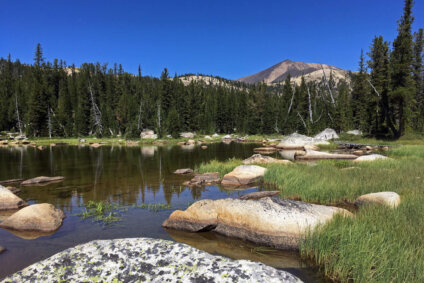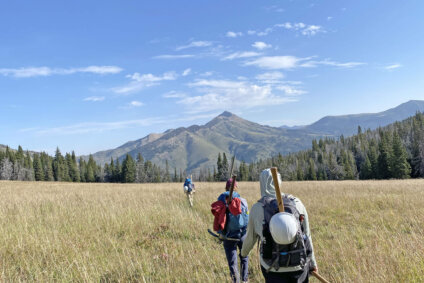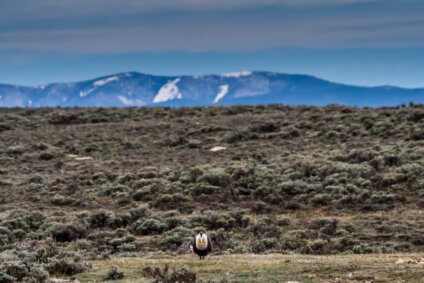Seven Ways to Minimize Your Impact in the Great Outdoors
Follow these simple guidelines to help protect your favorite wild places
“A wilderness…is hereby recognized as an area where the earth and its community of life are untrammeled by man, where man himself is a visitor who does not remain.”
This single sentence in Section 2. (c) of the Wilderness Act is the legal version of the “take only pictures, leave only footprints” rule I learned as a kid. While minimizing the impact you have when you’re hiking and camping is always a good idea, putting that idea into practice isn’t always so easy. Sometimes the most appealing campsite is in a grassy meadow on the edge of a lake, or a campfire on a chilly mountain evening is almost impossible to resist.
We’ve all been there, and it does take a decent amount of willpower to opt for a not-quite-as-waterfront campsite or pull on another layer instead of lighting up a fire. Even if treading as lightly as possible is easier said than done, it’s important that we do our best to minimize our impacts and leave our favorite places as wild, or maybe even wilder, than when we found them.
These seven Leave No Trace principles are easy enough to follow, and they’ll help us all ensure that our favorite places stay “untrammeled by man” when we’re out enjoying the outdoors that make Montana so special.
1. Plan Ahead and Prepare
Know your route, know the rules, and know your group. Then think of what your mom would ask you: Do you have a raincoat. Did you bring your hat? Why don’t you just take this one extra energy bar? Planning ahead will help you stay safe, have fun, and minimize damage to sensitive areas.
2. Travel and Camp on Durable Surfaces
Stay on the trail. If you’re not on a trail, try to stick to rock, dry grasses, or snow. If you’re off trail with a group, spread out so that you don’t pack down a new trail by walking single-file. When you get to camp, though it’s tempting to pitch your tent right next to water, stay away. Wildlife need to get to the shore, and if your tent is there, they won’t be. Pitch your tent at least 200 feet from lakes and streams.
3. Dispose of Waste Properly
There is no backcountry trash pick-up, so be sure to be responsible for your own. If you packed it in, you can pack it out. That applies to toilet paper, too. Use as little as possible, and pack it out in a Ziploc bag. No one likes to see TP draped over bushes or slowly disintegrating on the side of a trail.
4. Leave What You Find
Many wild places have a human history that extends back for many thousands of years, and if you’re lucky you might encounter artifacts, cavings, or drawings made by indigenous peoples who have lived in or visited these sites for generations. Look closely, but respect the artifacts and the people who made them by not taking them home, touching them, or otherwise changing them. The same goes for rocks and plants. All of these things look a lot better where they are now than they will dried up or removed from nature and left on your windowsill.
5. Minimize Campfire Impacts
Campfires burn the ground and it can take years – sometimes decades – for vegetation to grow back. Your best bet is to skip the campfire all together (after all, the sun is out in Montana until practically midnight for much of the summer). If you do have a fire, keep it small and camp below treeline where there’s plenty of down and dead wood. Of course, it goes without saying that you must make sure any fire is dead out before you leave it.
6. Respect Wildlife
Remember, “man himself is a visitor.” When you see wildlife in nature, don’t forget that you’re in their home. Observe from afar and keep your pets under control. Don’t make excessive noise (though advertising your presence in bear country is, of course, a good idea). Don’t approach or try to touch wildlife, even if you have good intentions. It’s also essential that you use a proper bear hang or a bear bin to make sure wildlife can’t get to your food, which will ultimately end poorly for both you and them.
7. Be Considerate of Others
Though you may feel like you’re the only one out there, other people are probably not too far away, and we’re all there to enjoy silence, solitude, and wildness. Do your best to keep your group small. Know who should yield to whom, and be polite and friendly when you see others on the trail. Take breaks off trail. Revel in the sounds of nature, not the sound of your hollering from the top of the mountain.
Share this article with your camping and hiking partners to encourage them to reduce their impact as much as possible, too, to help our wild places stay that way. And remember, this is just a quick overview of the Seven Principles established by the Leave No Trace Center for Outdoor Ethics. You can learn a lot more about Leave No Trace and the Seven Principles at lnt.org.
– Kassia Randzio, MWA development manager – grants and research

Stay Connected
"(Required)" indicates required fields


